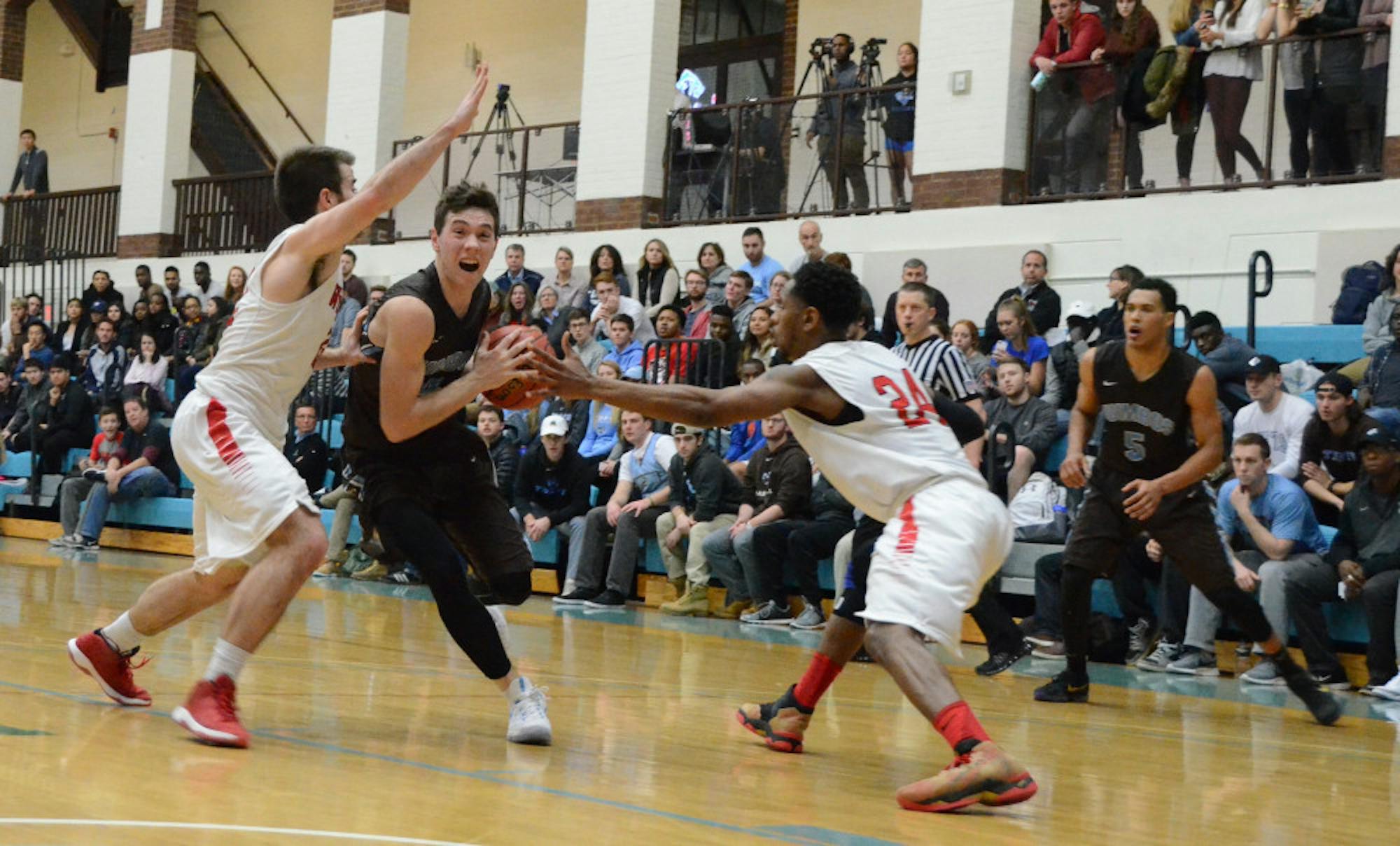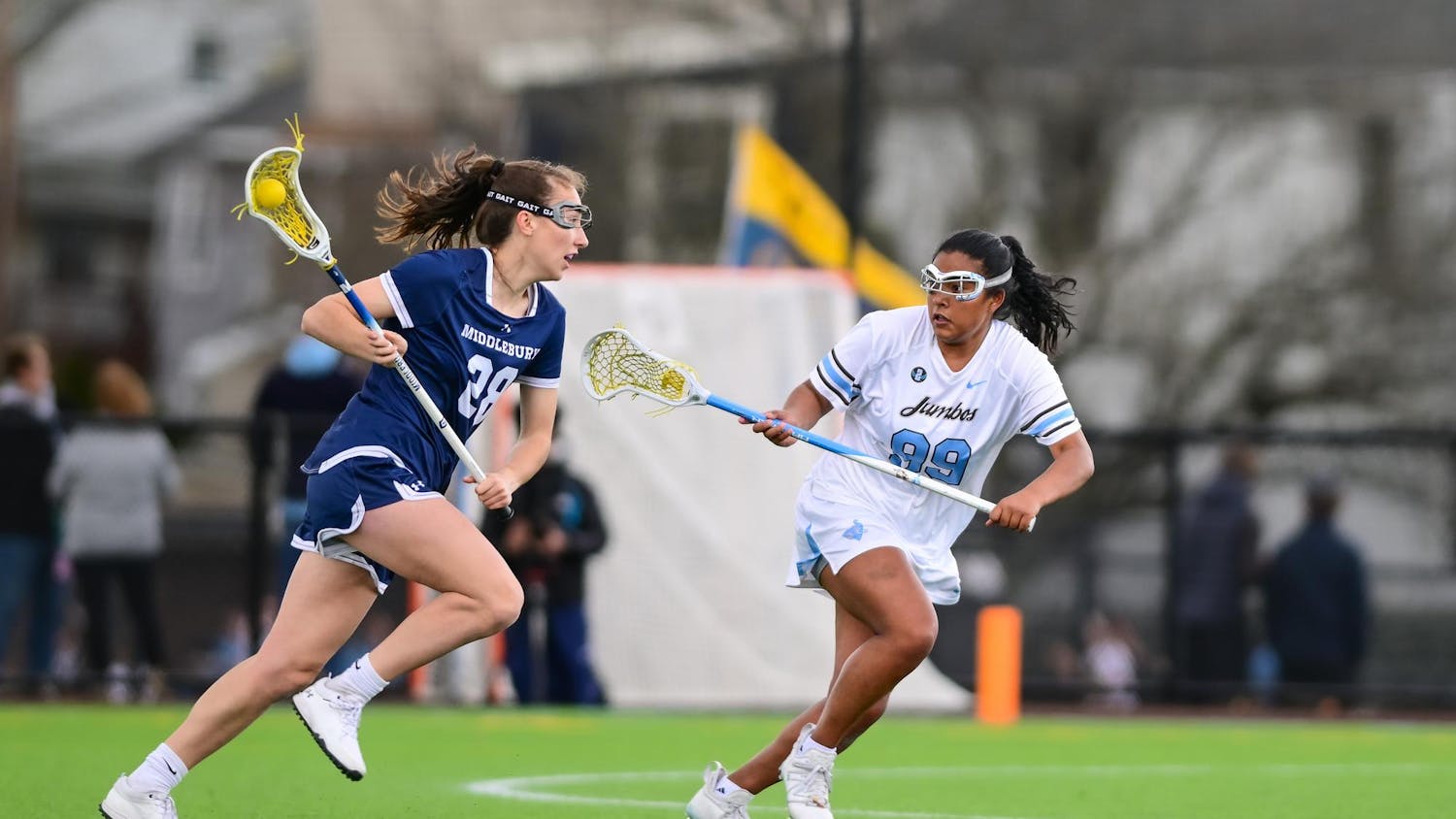Poor shooting from behind the three-point line has condemned the Jumbos (16-4) to two consecutive road defeats. According to sophomore guard Ethan Feldman, the team is now struggling through the most serious slump of the season.
“This is the first time we’ve had two games in a row where we’re not shooting well, [and] where we’re missing open shots," he said.
On Tuesday, the Jumbos came up short against the UMass-Dartmouth Corsairs (13-7), 91-82. Little separated the two sides during the first half, with neither team establishing anything larger than a six-point lead.Led by nine first half points by senior co-captain guard Chris Mendes, the hosting Corsairs entered the break with a slim 36-34 advantage.
For the first ten minutes of the second half, Tufts outplayed UMass-Dartmouth. The two teams traded the lead multiple times in the period’s opening minutes, and a layup by junior guard KJ Garrett with 11:20 left in the half gave the Jumbos a 58-52 advantage. After that high mark, however, Tufts collapsed. The Corsairs embarked on a 17-2 run, capped by a three-pointer by junior guard Tucker Bouchard with 8:10 remaining.
The Jumbos would not quit, and slowly but surely they clawed themselves back into contention. Two free throws by junior guard Vincent Pace with 2:45 left gave Tufts a 76-75 lead, but a quick layup by sophomore forward Arinze Obiora gave the lead back to UMass-Dartmouth for good, and the Corsairs concluded the contest with a 16-6 run.
The most serious deficiency for the Jumbos was poor three-point shooting. Junior guard Everett Dayton struggled the most in this respect, as he sunk just three of his 13 field goal attempts and missed all six shots from long range. As a team, the Jumbos shot 3-for-17 (17.6 percent) on three-point tries in the second half.
Feldman explained that the team was not willing to abandon its primary plan just because its failed to connect from downtown.
“We don’t want to pass up open shots. We’re used to playing a certain way ... and we’re supposed to take those open shots,” he said. “When we’re all not shooting well as a team, the only thing we can really do is pick it up defensively [and] try and run more in transition. But in the half court, if they leave us open, we can’t just drive into them. We have to shoot.”
Junior guard Thomas Lapham offered a similar view of how the team could find success on poor shooting nights.
“[We] just keep trying to get to the rim more,” he said. “[We] just [need to] get easy layups, and running in transition is big for us.”
On Jan. 28, Tufts fell to the Bates Bobcats (15-6), 84-72. The two teams were neck-and-neck for much of the first half, with a dozen lead changes in the first 15-minutes of the game. A pair of free throws by senior tri-captain guard Tarik Smith tied the contest up at 26 with 5:33 left in the first half. After that, however, the Jumbos would not regain any semblance of the upper hand. Bates' senior forward Marcus Delpeche scored seven straight points and the Bobcats entered the break with a 39-31 lead.
The Jumbos did not fare much better after halftime, and the Bobcat lead grew to as large as 18 with 11:58 remaining in the second half. Delpeche finished as the game’s leading scorer with 28 points, and senior guard Jerome Darling added 21 points to Bates’ total. For the Jumbos, Smith contributed 19 points, six rebounds and five assists. Additionally, junior guard Ben Engvall put up nine points and a game-high 12 rebounds.
The most decisive factor in the final outcome was once again a severe disparity in accuracy from the long range. The Bobcats made 10 of their 20 attempts from behind the arc. By contrast, the Jumbos hit just 5 of 27 three-point tries, which translated to a feeble 18.5 percent from deep.
According to Feldman, Tufts also struggled on account of the injury-inflicted absence of senior tri-captain center Tom Palleschi.
“Defensively, we let guys go middle way, way too much,” he said. “[Tuesday], we didn’t rebound well. We got killed in the paint. I think that [senior center] Drew [Madsen] and [first-year center] Pat [Racy] have been doing a good job, but we really miss Tom in the middle. We can’t get rebounds. We can’t defend guys in the paint.”
On Jan. 26, the Jumbos handily defeated the visiting Newbury Nighthawks (1-16), 113-74.Not since a 118-109 triple-overtime win against Keene State College on Dec. 6, 2006 has Tufts put up a loftier scoreline.
Tufts started slowly, missing their first five shots and allowing Newbury to jump out to an early 7-0 lead. The entry of Garrett three minutes into the contest signaled a stark reversal of fortunes, however, as he assisted a layup by Racy before adding a layup and three-pointer of his own to cut the deficit. By the 13:30 mark in the first half, the Jumbos had taken a 14-11 lead, which they would hold for the rest of the contest. Powered by sterling outside shooting performances by Lapham and Feldman - both of whom made several threes in the first half alone - the Jumbos took an authoritative 50-28 lead into halftime.
After the break, Tufts continued their offensive success, led by Dayton’s 12 points and seven rebounds in just nine second-half minutes. Newbury failed to regain any sense of momentum despite the best efforts of junior guard Jeduan Langston, who notched game-highs in points (33) and rebounds (10).Tufts, meanwhile, distributed the scoring load far more efficiently, with six players reaching double digits. Lapham led all Jumbos with 20 points, while Garrett added 11 points, nine rebounds and five assists in just 15 minutes of work.
Also key to Tufts’ success was a significant size advantage. No Nighthawk that logged a minute stood taller than 6’3”, while five Jumbos stood 6’5” or higher, allowing them to dominate the glass by a margin of 55-40.
On Friday, the Jumbos travel to Hartford, Conn. to play the Trinity Bantams (13-7) at 7 p.m.
Jumbos look to get back on track after road losses






